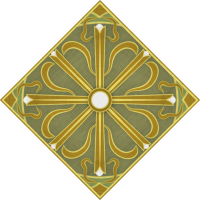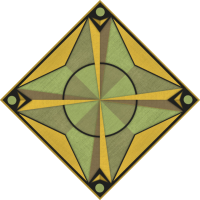Neighborhood Watch
Dec. 13th, 2018 03:57 pmFinrod tells Balan it is not wise, is not entirely safe, to stay in Ossiriand. He cites the complaints of the Green Elves, their worries and unhappiness. Better to move to an uninhabited area, one with room for crops and houses, he advises Balan. On the other side of the River Gelion the cleared plains next to the Forest of Region south of Nan Elmoth are well-suited for farmland. The lands are claimed by Amras and Amrod, but the two are rarely present, preferring to hunt to the south on the opposite side of the river, away from the trees patrolled by Doriath’s March-wardens. Everything but the pleasures of the hunt are beneath their notice, and Balan’s people have nothing the two sons of Fëanor would value.
The March-wardens and the Girdle figure heavily in Finrod’s calculations, for he has conversed long with Beleg and Mablung, who think highly of him, and with his sister’s beloved, Celeborn, and his brother. As long as Finrod vouches for these new arrivals, keeps peace with the Laegrim and King Thingol, and the newcomers do not try to trespass into the Girdle itself with their axes and ignorance (the rangers trust the power of Melian to stop any intruder, but in truth they tell Finrod that they fear more a misunderstanding between a human and one of the Ents that travel through these woods. The Ents are very touchy on the subject of axes), then the Marchwardens of Doriath with offer their own silent protection to this encampment of men. Their flanks will be guarded by the silent shadows in the trees, but left alone.
Mablung takes one look at the collection of tents and campfires, grunts, and asks if the humans need better spears and axes, for the armories of Menegroth are full with old dwarf-work. The warriors that once wielded the weapons died south of here, near a lonely hill. Mablung won’t even charge a price; better to let the humans clean the rust from the blades. Less chance of King Thingol hearing about the trade, and it is all in the name of safer borders anyway. Beleg thinks the humans are cute, far cuter than the dwarves that Prince Eöl found (“Haven’t heard from him in a century or two. Might send a messenger up to his place since we’re in the area. Not that we care to talk with him, or him to us. Maybe I’ll choose a messenger by drawing straws, or pick the greenest recruit. You wouldn’t want to go talk to him, Prince Finrod? You’re very good at talking with people, and you have a friendship with the dwarves in common. Wait, you are technically Noldor; I forget that. I'm so used to thinking of you as the King’s nephew. Never mind.”). Celeborn offers a few horses, and seed for crops that will grow in the soil of Estolad, which Finrod and Balan’s family thank him profusely. Balan and his sons tell the silver-haired elf that the boats lent to help with crossing of the River Gelion were more than enough assistance, but Celeborn waves off their gratitude with stuttered repetitions of how he was glad to help them as he may and please stop thanking him before he blushes red with embarrassment. If he glows any brighter, Galadriel will never let him live this down. Cryptically she tells her fiancee to become accustomed to this, eyes distant with foresight. Celeborn's brother, Galathil, repeats the grievances of the Green Elves and takes no interest more.
Most of all Finrod does not say the words he heard Fëanor spew and his sons repeat, of how the Aftercomers would defraud them of their rightful kingdoms of Middle-earth, none would oust them, that they would refuse to share power, lordship, bliss, beauty, and light with anyone outside themselves, least of all the mortals unknown. Finrod knows these mortals, and he wishes to share everything with them. He regrets that he cannot give all beauty and bliss to Balan and his people. He told Balan he was not Oromë, insisted to the mortals that he was but another elf, though dressed unlike the ones the human knew from the other side of the mountains, and not a Power. Never more clearly does Finrod understand the Valar, though, in this fierce and protective need to provide the people he loves with the same privileges his people were afforded. He tells the foreboding in his heart that his fears are unfounded. His cousins will never attack another settlement. Finrod clings to the condolences of Mereth Aderthad and the vows of forgiveness. Balan’s people need good neighbors, safe neighbors - ‘better neighbors than Alqualondë had’, he thinks and flinches and vows not to be Angrod. It is not his fault that the mortals have arrived to an unsafe land, that he had to break their hopes of a home free from Morgoth. But Finrod plans walls and palisades to encircle the houses constructed in Estolad, speaks of the benefits of alliances to his brothers and the kings Thingol and Fingolfin, questions Balan on how he kept his people safe during his journey and what more can be done. Most of all Finrod remembers the unspeakable hardship of Helcaraxë, too great for even elven bodies to endure, impossible for weak mortals to cross. If only... Only a few months he has known Balan and his people, and Finrod wishes he was strong enough to endure the loss of their friendship, the uncertainty of knowing their fate. Balan eyes him with a wisdom Finrod has seen only in Círdan and Ingwë and tells the elf lord that Finrod’s task is not to protect the humans from all ills and dangers. Not even the Powers, of which Finrod has shared with Balan their true names, could accomplish that. His friendship is gift enough.The opportunity that Estolad offers his people is hope and gift enough.
The House of Bëor and their Nóm are one of the best and inspiring multi-generational friendships. This is inspired by Ch. 17 "Of the Coming of Men into the West".
I am directly paraphrasing from the other passage that inspired this quote: "for [Fëanor] echoed the lies of Melkor, that the Valar had cozened them and would hold them captive so that Men might rule in Middle-earth. ... "We and we alone shall be the lords of the unsullied Light, and masters of the bliss and the beauty of Arda! No other race shall oust us!" " (Silmarillion 89-90)
I firmly believe one of the reasons the Third Kin-slaying is accounted the cruelest is because half if not a majority of those slain would have been mortals, so aside from how heinous the attack was and how few survivors were left, that is one of the only confirmed times when elves are killing Edain - or indeed any humans not directly allied and fighting on the side of Morgoth and Sauron.
Celeborn’s part is a direct allusion to ‘Farewell to Lórien’ in FotR.








